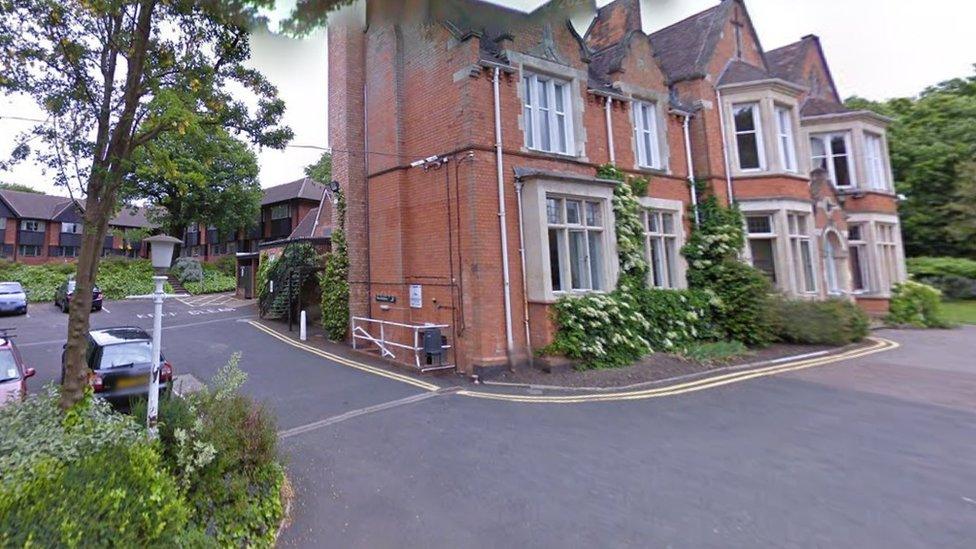Hospital neglect contributed to death of Birmingham psychiatric patient
- Published

Matthew Caseby, who was a patient at Birmingham's Priory Hospital Woodbourne, left the hospital by climbing over a fence in the courtyard
Failings amounting to neglect contributed to the death of a man who fled a hospital and was hit by a train, an inquest has concluded.
Matthew Caseby, who was a patient at Birmingham's Priory Hospital Woodbourne, absconded by climbing a fence in September 2020.
The inquest heard he had been left unsupervised in a courtyard area.
The hospital apologised for the shortcomings in care identified during the two-week inquest.
The personal trainer, who lived in London, had been detained under the Mental Health Act by Thames Valley Police on 3 September, after reports of a man running on to the railway tracks in a village north of Oxford.
He was then admitted to the Priory in Birmingham where, the inquest heard, he should have been under constant observation.
The 23-year-old was hit by a train near Birmingham's University station on 8 September, the day after he was seen leaving the hospital.
The jury was told despite concerns by members of staff about the fence and the courtyard, no action was taken to improve security in that area until another patient absconded two months after Mr Caseby's death.
The coroner for Birmingham and Solihull, Louise Hunt, said she was concerned the fence and courtyard area may still not be safe.
The narrative verdict, delivered by the jury on Thursday, said Mr Caseby had been left "inappropriately unattended" in the hospital's courtyard, which was "not suitable for patients to use" due to the lack of risk assessment.
The jury concluded:
As a result of risks not being fully recorded, Mr Caseby's risk assessment was not adequate, as it was not based on all the available information
There were shortcomings in the Priory processes for recording and sharing information between staff
When reviewing [previous absconsions] there was insufficient attention paid to the physical security of the area
His death was contributed to by neglect on the part of the treating hospital.
In a statement issued after the inquest, Mr Caseby's father Richard said there had been a "litany of failings," at the hospital which had failed to assess his son's risk of absconsion.
'Previous escapes'
"Matthew escaped over a low fence when left unsupervised in a courtyard just 60 hours after admission and died shortly afterwards," he said.
"The hospital was aware of previous escapes over the same low fence and yet had done nothing to improve security."
He added the Priory had "wrongly assessed him as a low suicide risk".

Matthew Caseby's father said there had been a litany of failings at the hospital
Psychiatrist Prof Jennifer Shaw, who carried out an independent investigation into the incident, told the inquest jury that Mr Caseby had previously "tried to tailgate staff" at the hospital and should have been classed at "high" risk of absconding.
Describing his son as a "beautiful, gentle and intelligent young man" Richard Caseby said the Priory Group "were accountable for Matthew's care and safety yet they failed profoundly to prevent harm to him".
"We can never bring Matthew back, but we can prevent this ever happening again."
Matthew was sent to the Woodbourne Priory by the Birmingham Women's and Children's NHS Foundation Trust, which outsources NHS mental health care for young adults, Richard Caseby added.
He said NHS England should review its national policy of outsourcing mental health beds to a supplier.
National guidelines
The coroner, Ms Hunt, said there were several areas of the evidence heard which left her concerned including the safety of the courtyard area and staff recording information in two different places.
She added she intended to write to the Department of Health and Social Care with regard to national guidelines covering mental health units.
A spokesman for the Priory Hospital Woodbourne said: "We would like to say how deeply sorry we are to Matthew's family, and we apologise unreservedly for the shortcomings in care identified during both the investigation process and the inquest.
"We accept that the care provided at Woodbourne in this instance fell below the high standard patients and their families rightly expect from us, and we fully recognise that improvements are needed to the service.
Changes had already been implemented in relation to policies, procedures and the hospital environment, it said, adding it had spent more than £40m over the last three years on improving safety across all of its facilities.
"We would welcome national guidance on how best to achieve the most appropriate level of security in acute mental health units, while balancing the need for these to remain therapeutic and rehabilitative environments."

Follow BBC West Midlands on Facebook, external, Twitter, external and Instagram, external. Send your story ideas to: newsonline.westmidlands@bbc.co.uk, external